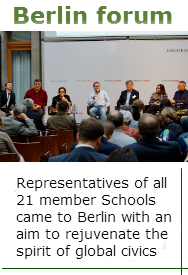Opening of the Second Summer University for Democracy
Speech by Terry Davis, Secretary General of the Council of Europe
Strasbourg, 2 July 2007
President Tadic,
Ladies and Gentlemen,
Vice-President Lindblad,
Friends,
Welcome to the Council of Europe and to our Second Summer University for Democracy, which will focus on Europe.
I will take this opportunity to talk about the Council of Europe which is often described as a pan-European organisation. Sometimes, I think that this description is both redundant and confusing. The obvious fact is that the Council of Europe is a European organisation, both in terms of its geographical scope and in the sense of the values it represents, defends and promotes.
The Council of Europe is the guardian of a code of conduct which applies to the entire continent and to all authorities which have the power to affect individual rights protected by the European Convention on Human Rights and other legally-binding instruments.
I know that the public often finds it difficult to distinguish between the European Union and the Council of Europe. I therefore offer my own, very concise definition of the difference - the European Union is about the standard of living; the Council of Europe is about the quality of life.
In this short speech, I will outline my vision of the Council of Europe for the years to come.
My vision of the future for the Council of Europe is as realistic as it is ambitious. The Schools of Political Studies are meant to encourage independent and critical thinking so that I do not expect you to accept my confident claim at face value. So here are my arguments.
To start with, the main responsibility of the Council of Europe, which is to protect and extend human rights, democracy and the rule of law, is as relevant and necessary as it was 58 years ago. Our business is and always will be unfinished – by definition. The environment in which we operate is changing constantly and rapidly, and our task is to ensure that our standards and our methods of enforcement are adapted to this constantly changing reality. There was no Internet at the time the European Convention on Human Rights was adopted, but today, the Council of Europe must make sure that its standards also apply in cyber-space.
My second point is related to our improving and better defined relationship with the European Union. For decades, intergovernmental co-operation – which is at the heart of the Council of Europe – was regarded as old-fashioned, time consuming, even obsolete. But in recent years, intergovernmental co-operation in Europe is back in fashion. On the one hand, international conventions often make for better progress in areas closely associated with national sovereignty, such as the judiciary, police and immigration. Moreover, international conventions are more open-ended than EU legislation. It is a fact that most of the recent Council of Europe conventions are open to the participation of non-European countries. In the light of the problems they deal with, such as cyber-crime, terrorism or trafficking in human beings, their broad geographical character is clearly a very significant added value. But again, one approach does not exclude or compete with the other. In the Council of Europe, we encourage all our member states or groups of member states to support and, whenever possible, to go beyond the minimum standards set by our treaties.
For its part, the European Union has also made very good progress in clarifying its relationship with the Council of Europe.
In February, the EU created a new Fundamental Rights Agency with a mandate to scrutinise EU institutions and the application of EU laws. In my view, the new Agency can make a useful contribution to helping the EU to comply with Council of Europe standards based on the European Convention on Human Rights. The Council of Europe will appoint someone to the Management and Executive Boards of the new Agency, and this should help the Agency to benefit from Council of Europe expertise, rationalise the use of taxpayers’ money and prevent double standards in the protection of human rights in Europe.
In May, the EU and the Council of Europe signed a Memorandum of Understanding which creates a formal framework to continue and expand our co-operation.
Ten days ago, the Heads of State and Government of the member states of the EU agreed to negotiate a new treaty which should pave the way for EU accession to the European Convention on Human Rights. This is a long-overdue and very important development and very good news for the citizens of EU member states. They will enjoy a higher level of protection of their human rights, including protection against violations committed by EU institutions.
My next reason for optimism may sound like a paradox because it is related to the heavy workload of the European Court of Human Rights. While we continue to look for effective solutions to the problem of the large number of applications, we must not lose sight of an important fact – that the rapidly increasing number of applications is a sign of the hope and trust of ordinary people in this unique institution.
Finally, the Council of Europe’s main asset is that it is neither a top-down nor a top-heavy type of organisation. What is happening here in Strasbourg is only the tip of the iceberg. The bulk of our activities are undertaken in our member states, by national and local authorities and by civil society. Schools of Political Studies are an excellent illustration. The Summer University in Strasbourg is the culmination of your work throughout the year in the 15 schools across Europe. Everyone tells me that this Council of Europe activity is highly appreciated. It is aimed at training the politicians of the future and very often the future is not very far ahead. The closing speaker at this Second Summer University will be Mr Oliver Dulic from Serbia. Last year he was here as a participant, this year he is here as the newly-elected Speaker of the Serbian parliament.
The Council of Europe today is vibrant, relevant and successful. But the room for improvement is the biggest room in the world. We need to change, and we will change. In the next decade, the Council of Europe will create and manage a genuine European legal space, develop and operate a European monitoring system and make its expertise the leading reference for compliance with standards of democracy, human rights and the rule of law in Europe. The Council of Europe will also step up its campaign activities, become the public advocate of European values and reinforce its co-operation with the civil society.
The Council of Europe has 47 member states. When it comes to compliance with our standards of democracy and human rights, some are doing better than others. Sometimes we get criticised for being too lenient, and sometimes such criticisms are justified. But we must not forget one important fact – the Council of Europe is not a beauty contest or a fashion show. It is a place of work. All our member countries have joined voluntarily and promised to respect the rules. We are here to help them, and as long as progress is made, membership is justified and meaningful. For me, the ultimate test must be the rights of individual citizens. The Europe which is built in the Council of Europe is not a theoretical one. I said at the beginning that we are about the quality of life, and the quality we strive to achieve is the kind Europeans can benefit from, not just believe in.








